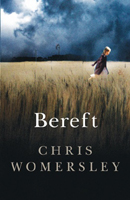 |
Bereft Chris Womersley Scribe Publications 2010 |
[This novel has been shortlisted for the 2011 MIles Franklin Award.]
From the publisher's page:
It is 1919. The Great War has ended, but the Spanish flu epidemic is raging across Australia. Schools are closed, state borders are guarded by armed men, and train travel is severely restricted. There are rumours it is the end of the world.
In the NSW town of Flint, Quinn Walker returns to the home he fled ten years earlier when he was accused of an unspeakable crime. Aware that his father and uncle would surely hang him, Quinn hides in the hills surrounding Flint. There, he meets the orphan Sadie Fox -- a mysterious young girl who seems to know more about the crime than she should.
A searing gothic novel of love, longing and justice, Bereft is about the suffering endured by those who go to war and those who are forever left behind.
Reviews
Peter Pierce in "The Sydney Morning Herald": "After the critical acclaim for The Low Road (2007), his first novel about two desperates on the run, Chris Womersley was evidently undeterred by the hurdle of its successor. Bereft is a bleak and brilliant performance that confirms him as one of the unrepentantly daring and original talents in the landscape of Australian fiction. (And there is no clank of the creative-writing production line about him.)...Few recent novels, Australian or otherwise, have such eloquence, prompted by the despair of sufferers who do not shirk the task of seeking the right words...The last part of Bereft is frightening in a way that reminds one of why several reviewers of Womersley's first novel made comparisons with Cormac McCarthy. In the novel's bloody climax, the Angel of Death appears to torment one of the guilty. Other characters vanish into a fog of rumour. The most chilling words of Bereft are reserved until the last page. This is an outstanding work of Australian fiction. Read it next."
Jennifer Levasseur in "The Age": "The Low Road, winner of the Ned Kelly award for best first book, examines the anguish of lives gone hopelessly wrong, of men pushed beyond what they felt were the limits of their capabilities. Bereft, Womersley's new novel, is a strong, more compelling follow-up that explores some similar themes but urges them to new depths...Beautifully written and conceived, Bereft pushes at the borders of literary fiction and thriller, spinning a horrific incident in one man's life into a page-turning reflection on grief and guilt, on the nature of storytelling and its inevitable joys and shortcomings, on what we have to believe in order to survive."
Geordie Williamson in "the Australian": "It must have been some expression on Chris Womersley's face after the eureka moment when Bereft was born...First, excitement at the potential of setting an Australian gothic novel in the immediate aftermath of World War I, during the influenza epidemic that turned rural Australia into a patchwork of plague villages; then, anxiety that someone else might write it first. I would have hugged the manuscript to my person like Gollum's ring...Now he has relinquished the story, it's worth noting that Bereft represents an elaboration of those attitudes and concerns that made his 2008 debut, The Low Road, so gripping, such a cut above the usual genre fare. It is a whodunit that yields up its secret halfway through: a murder mystery from an era when death undid so many that the worst crime became a dreary norm. The novel's historical moment activates a nihilism that settles, like the mustard gas which has ruined its hero, over everything and everyone."
Lucy Clark in "The Courier-Mail": "Womersley combines really beautiful and eloquent writing with a compelling story, and Bereft has a literary sensibility flavoured with the drama of a mystery...His characters are gently but thoroughly drawn, with Quinn Walker reflecting on his defining experiences at war - these scenes are bloody and visceral - and in particular his experience at a seance where he may or may not have been contacted by the spirit of his beloved sister...Bereft is a haunting and beautiful novel that will surely deliver an excellent Australian writer to a much wider audience."
Thuy Lunh Nguyen in "Kill Your Darlings": "Bereft's imagery is also softer than its predecessor's. In The Low Road, Womersley evokes characters and settings by building upon our familiarity with the modern city...On the other hand, Bereft must work with weaker foundations - second-hand accounts of events beyond living memory; hence, Womersley's sketches leave only an impression of an era, a nation's mood - nothing concrete. Nevertheless, his early twentieth century New South Wales is a convincing one, thanks to his characters, who exhibit a healthy respect for both the scientific and the arcane: Quinn's father is enamoured by electricity and aeroplanes and yet swears he has seen a yowie. These individuals make up a society that knows how to build tanks but also has a real fear of dead men walking and Armageddon...The townsfolk's superstitions combined with supernatural happenings mark Bereft as a historical novel with gothic sensibilities."
Angela Meyer in "Bookseller+Publisher": "Chris Womersley's Bereft, his second novel after 2008's award-winning The Low Road, is a rich, gripping tale of love, loss, conflict and salvation....This book is thoroughly enjoyable, compelling, moving, warm and completely memorable. I had that very rare experience of wanting to read it again, almost immediately. This book crosses the lines of popular fiction, literary fiction and mystery."
Sam Cooney on "Readings Bookshop" website: "Like all great literary fiction, Bereft aspires to go beneath the surface, beyond flimsy payoffs and superficial triumphs. In doing so it confronts such pillars as loss, longing and revenge, and sears itself into memory."
Interviews
Peter Mares on "The Book Show".
Booktopia blog
All the World's Our Page blog
Other
The author himself has a webpage devoted to this book.
Book Trailer
